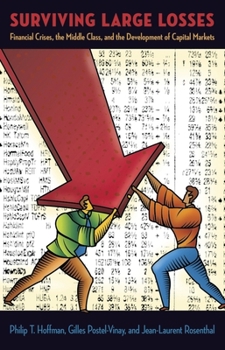Surviving Large Losses: Financial Crises, the Middle Class, and the Development of Capital Markets
Select Format
Select Condition 
Book Overview
Listen to a short interview with Philip T. HoffmanHost: Chris Gondek Producer: Heron & Crane
Format:Paperback
Language:English
ISBN:0674036360
ISBN13:9780674036369
Release Date:September 2009
Publisher:Belknap Press
Length:272 Pages
Weight:0.65 lbs.
Dimensions:0.8" x 5.0" x 7.8"
Customer Reviews
1 rating
Valuable look at why some countries' financial systems work
Published by Thriftbooks.com User , 17 years ago
The authors take a look at how financial systems develop, frequently under the spur of financial crisis. Their arguments are supported by many interesting historical examples. The book begins with a look at how crises develop, from government predation and/or asymmetrical information (the seller knowing more than the buyer for example). It then reviews how different political systems respond to crises. They also show that a well functioning financial system requires the right level of government (enough debt to get a bond market started, but not so much as to encourage the politicians to steal to pay it off, as in Argentina), a large enough middle class to provide a market for financial products and to discourage too much theft by government (the poor have no assets, the rich can afford to set up their own financial programs), and how the costs of information tie this together. The book ends with a look at some current situations, particularly microcredit and the looming problems of pensions and health care for a rapidly aging world with a static or declining population. Their analysis is more theoretical than Kindleberger's 'Manias, Panics, and Crashes' and is focused on the structure of financial systems and how crises change them (not on panics per se). Their discussion on pensions theorizes that privatization can not work, but doesn't discuss current private pension programs (in Chile for example). And the discussion of the role of asymmetric information mostly ignores the role of public manias. The authors used Enron as an example as an example of asymmetric information (since management's financial reports clearly did not reflect reality) but a look at the published 2000 Annual Report shows that in 2000 Enron was only marginally profitable, with a return on average equity of 8.6 % and a return on assets of 1.8 %. Operating earnings for 1998, 1999, and 2000 were 4.4 %, 3.1 %, and 1.9 % of sales. Yet the high price for the stock was over 4 times book value and 40 times earnings. Clearly a combination of ignorance and insanity was involved (the ignorance extended to the media; Fortune magazine proclaimed Enron as 'the most innovative company in the world' without wondering how anybody so wonderful had such a lousy return on investment). Overall an very interesting and valuable look at financial systems, and how they develop and change within a country.





